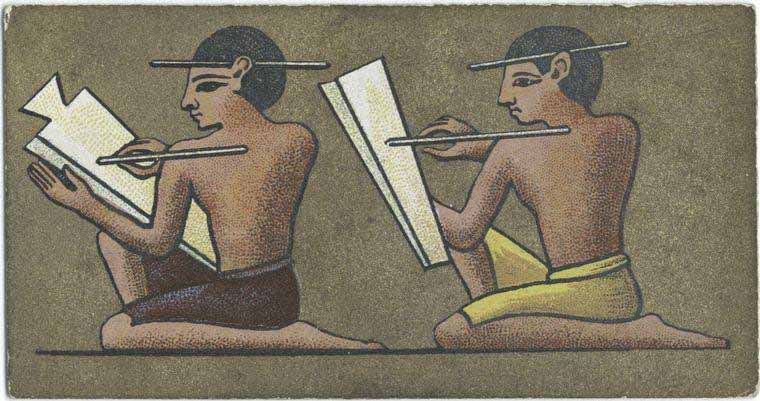
Egyptians who were trained to read and write were called “scribes,” from the Latin word “scribere,” which means to write.
They wrote for the pharaoh’s tomb, on pieces of ostraca(pottery), papyrus, and on statues. Scribes sometimes spent their whole lives writing a specific assignment. Being a scribe was full of hardship, sometimes depression, not believing in yourself, e.t.c. The job wasn’t made with ease. For these reasons, along with being respected by everybody in Egypt, scribe’s would never share their knowledge, unless they were teaching a future scribe, to keep their highly ranked position.
Being a scribe is for a specific type of person, and very rarely was this job given to someone who came from a poor family. Whenever a scribe passed, a new scribe that had been in training is hired. There was a kind of limit for the amount of scribes there could be. They were incredibly important people, and without them, what would the history of Egypt be?

There wouldn’t be such thing as a scribe if it wasn’t for the beloved god Thoth(the god of knowledge). He gifted the Egyptians pictures, which they transformed into their language, Hieroglyphics. Scribe’s had kept the language alive for many years, and the Egyptians thought they would for many more, until Egypt was invaded and the language got lost in the ruins. Egyptians didn’t only owe a thank you to their great god Thoth, but to scribe’s, for making sure the Egyptian language was passed on from generation, to generation.
Later on somebody by the name, Jean Francois, rediscovered Hieroglyphics. He had studied the language for many years. It had all started when he had heard about a big stone, called the Rosetta Stone. It was in two different languages, Egyptian Hieroglyphics(the more proper version of writing), and Greek. Jean Francois was very interested in this topic. At the time he was a young boy. He spent his whole life studying the language. And then one day and Englishman named Thomas Young came along and figured out that Hieroglyphics were letters. Jean Francois started studying even harder. For five days he was nearly dead from not eating, drinking, or sleeping. And then it happened. He cracked the code! Though today it is not positive that that is what it translates to.
Scribe’s dedicated their lives to reading and writing, because then in Egypt isn’t like how now everybody reads and writes. To do such thing was a gift. A wonderful gift. That many people did sometimes wish they had themselves.
Butcher, Kristin, and Martha Newbigging. Pharaohs and Foot Soldiers: One Hundred Ancient Egyptian Jobs You Might Have Desired or Dreaded. Toronto: Annick, 2009. Print.